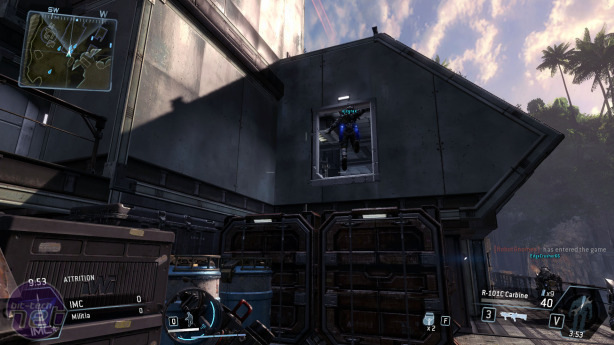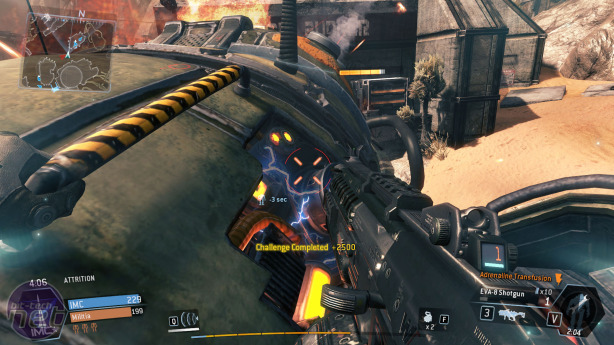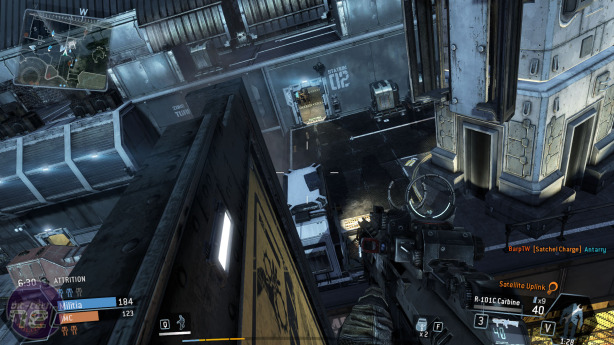
When used, these cards boost your capabilities in varying ways for as long as you stay alive. Some have simple effects, such giving you a more powerful version of a particular weapon, or cutting time off your Titan-build. Others are more interesting. One card camouflages you as a Spectre, the AI robot soldiers that populate Titanfalls maps, which confuses the hell out of an opponent when the Spectre they're fighting suddenly runs along a wall and kicks them in the face. Meanwhile, some Burn cards can be matched with Pilot or Titan builds to devastating effect.
A good example is combining a shotgun-toting pilot with an aural-implant, which lets you temporarily see the locations of friendly and enemy units through walls, and an "adrenaline-transfusion" Burn Card that significantly increases your running speed. The result is a laser-guided, rocket-propelled sucker punch that can home in on an opponent and is far too quick for them to react. Smartly used Burn Cards can have a genuine effect on the outcome of a battle, but their power is only fleeting, ensuring that they're not unfair.
In terms of FPS design Titanfall is easily the best thing to come around in years, and campaign-aside there's very little that's problematic about the core systems. So it's a shame that EA/Respawn kick themselves in the Titans elsewhere. Titanfall doesn't make use of any of the advantages the PC offers to multiplayer games. Lobbies are entirely automated, and aside from inviting friends into your Lobby, you have no control over how you play the game. You can't select what map you want to play on. There are no dedicated servers or ways to modify the game. Hell, the lobbies don't even have team-autobalancing, and with only six player per-team, losing one or two players during a game can have a massive influence on the outcome.
This obsessive approach to controlling how players experience Titanfall severely risks choking the life out of the game, and removes any possibility of players taking Titanfall's ideas and running with them, creating new experiences out of the brilliant framework Respawn have provided. There will be no DE_Dust for Titanfall, no Red Orchestra, no DayZ. This is immensely sad, because Titanfall is precisely the kind of game that might inspire such creative output from the community, as it strives to be fresh and different and clever in and of itself.
There's also the matter of the price. Even on PC Titanfall costs a whopping £45, and while there's more content than is initially apparent, due to the efficiency with which Titanfall shows it to you, that's a lot of money for any game. In fairness, Titanfall is worth that kind of price more than the majority of other games from big publishers with similarly extortionate price-tags, but it still means you're likely to be wincing over the expenditure as much as you are looking forward to playing the game.
It's annoying that, for a game that tries so hard to innovate and refresh the multiplayer FPS, that when it comes to delivering that experience to its players, Titanfall demonstrates the exact same problems that have dogged online shooters for years. Drop that price a little, and relinquish the iron-like grip on how players actually "play" Titanfall, and you've got a classic. As it stands, Titanfall is merely very good.
A good example is combining a shotgun-toting pilot with an aural-implant, which lets you temporarily see the locations of friendly and enemy units through walls, and an "adrenaline-transfusion" Burn Card that significantly increases your running speed. The result is a laser-guided, rocket-propelled sucker punch that can home in on an opponent and is far too quick for them to react. Smartly used Burn Cards can have a genuine effect on the outcome of a battle, but their power is only fleeting, ensuring that they're not unfair.
In terms of FPS design Titanfall is easily the best thing to come around in years, and campaign-aside there's very little that's problematic about the core systems. So it's a shame that EA/Respawn kick themselves in the Titans elsewhere. Titanfall doesn't make use of any of the advantages the PC offers to multiplayer games. Lobbies are entirely automated, and aside from inviting friends into your Lobby, you have no control over how you play the game. You can't select what map you want to play on. There are no dedicated servers or ways to modify the game. Hell, the lobbies don't even have team-autobalancing, and with only six player per-team, losing one or two players during a game can have a massive influence on the outcome.
This obsessive approach to controlling how players experience Titanfall severely risks choking the life out of the game, and removes any possibility of players taking Titanfall's ideas and running with them, creating new experiences out of the brilliant framework Respawn have provided. There will be no DE_Dust for Titanfall, no Red Orchestra, no DayZ. This is immensely sad, because Titanfall is precisely the kind of game that might inspire such creative output from the community, as it strives to be fresh and different and clever in and of itself.
There's also the matter of the price. Even on PC Titanfall costs a whopping £45, and while there's more content than is initially apparent, due to the efficiency with which Titanfall shows it to you, that's a lot of money for any game. In fairness, Titanfall is worth that kind of price more than the majority of other games from big publishers with similarly extortionate price-tags, but it still means you're likely to be wincing over the expenditure as much as you are looking forward to playing the game.
It's annoying that, for a game that tries so hard to innovate and refresh the multiplayer FPS, that when it comes to delivering that experience to its players, Titanfall demonstrates the exact same problems that have dogged online shooters for years. Drop that price a little, and relinquish the iron-like grip on how players actually "play" Titanfall, and you've got a classic. As it stands, Titanfall is merely very good.
-
Overall84 / 100


MSI MPG Velox 100R Chassis Review
October 14 2021 | 15:04












Want to comment? Please log in.